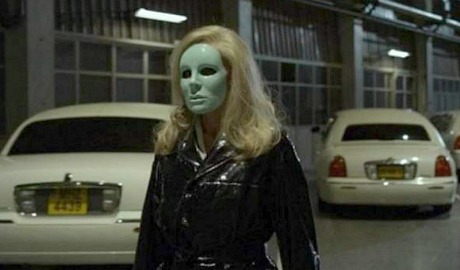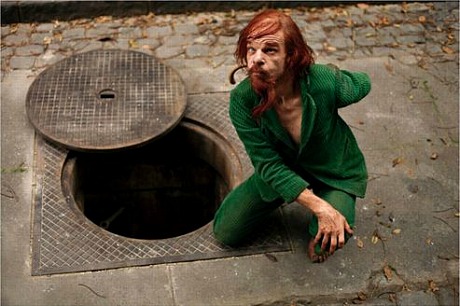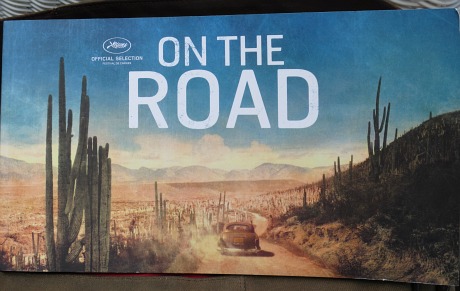A producer who’s been around forever (and whom I’ve known for a couple of decades) said something interesting at tonight’s On The Road after-party: “Whenever there’s strong sexuality in a film, you always lose about 30% of the critics.” He may have meant precisely that, but I don’t think he was saying that this 30% hates any film with strong sexuality. I think he meant that pronounced sex scenes tend to diminish their enthusiasm, either somewhat or significantly. Thoughts?
Day: May 23, 2012
Problematic
I need to find a staunch Carlos Reygadas fan who caught tonight’s screening of Post Tenebras Lux, as I did, who could maybe share his or her interpretations. (Is Manohla around?) There’s an undercurrent of dread throughout, but mostly it lacks connective tissue. Three scenes of abrupt violence (especially the final one) are…well, I suppose the term is “noteworthy.” And it contains a truly strange, Hieronymous Bosch-like orgy scene in a Turkish bath sex club. And a moving deathbed soliloquy (although there’s no clue that the speaker is dying when he delivers it). But otherwise I found it slow, lumpy, indulgent and mystifying. Don’t get me started on the soccer game footage. Social rot and demonic behavior are the subjects, but it doesn’t tie together.
Hors d’Oeuvres
Last night Deadline‘s Nancy Tartaglione reported that clips from a few unseen, keenly awaited films will happen tomorrow (Thursday) in Cannes at the Salle du Soixentieme. Footage from Juan Antonio Bayona‘s The Impossible, the Asian tsunami movie starring Ewan McGregor and Naomi Watts, may be included in the presentation. (The Lionsgate/Summit release was shown in its entirely to elite journos in Los Angeles a couple of weeks ago.)
Tribute
Good on the USPS for putting these out, but when was the last time anyone bought or used a stamp? I’m honestly having trouble trying to remember when I last did, but it must be two or three years, and perhaps longer. Packages, yes. FedEx and UPS, sure. But…?

Surreal Adventures, Games, Inhabitings
I got out of the noon showing of Leos Carax‘s Holy Motors about 100 minutes ago…holy moley! Holy Paris, holy Trip City, holy nocturne, holy inferno, holy freedom, holy holy, roly poly, put on the wackazoid. Holy white stretch limo. Holy wigs and fake beards and long nails and spirit gum. And holy Denis Lavant, Eva Mendez, Kylie Minogue and Michel Piccoli! Dali/Bunuel/Lynch/Carax live large. Welcome to Holy Nuttervile in the best, most spirit-releasing sense of that term.

If only an American filmmaker was this mad, this imaginative, this unchained, this willing to leap. I wonder if any American has it in him or her to create something like this. If he or she did, Americans would probably say “what the fuck?” and stay away in droves. It’s in the realm but well beyond anything David Lynch has ever done. It’s so perfect to have seen this in Cannes, and to be among a crowd clapping and cheering on their feet, and then to come onto a street filled with sun and warmth.
It’s basically a dreamscape movie about a possibly wealthy guy named Oscar (Lavant) whose job it is to tool around Paris in a big white limo and pretend to be other people, complete with first-rate makeup and latex and wigs and you-name-it. It’s the inner life of a mad director (i.e., Carax) who’s letting his imagination run wild. Who pays Oscar or why he would be rich doing this kind of thing, or why he goes home to a small white condo and has two chimpanzees for children instead of the two or three human kids he waves goodbye to in the beginning…forget all that. This movie is about playtime. Anything can, will and does happen, and reality has nothing to do with it. And yet it feels grounded in the stuff. It’s “loony” but believable. And very handsomely shot.
Oscar’s first pretend is an old, bent-over crone panhandler, begging for coins with a cup. Actually that’s the third pretend, come to think. His first appearance is in pajamas, getting out of bed and looking out a large picture window at an airport runway, and then finding his way into a theatre full of people with a naked toddler walking down the aisle. And then he’s a super-rich businessman with a big white modernist home and the kids on an outdoor balcony. And then comes the old crone. And then he’s a lithe actor wearing a mo-cap suit and doing a kind of battle dance with a Darth Maul sword and a machine gun, and then an erotic dance with a lycra Lady in Red.
And then he’s a deformed, snag-nailed Rasputin figure who worms his way into the sight lines of some fashion-maggers shooting Mendez in what looks like Pere Lachaise, and then he kidnaps her and carries her to his lair like Quasimodo carrying Esmeralda. And then he’s a bald-headed, moustachied assassin with a switch knife. And then a tired, middle-class dad picking up his daughter from a party. And then Keir Dullea at the very end of 2001, under sheets on a large bed in pajamas only white-haired and with no black monolith. And that’s only part of it.

Densi Lavant in one of many guises in Holy Motors.
The only Carax films I’d seen until today were Boy Meets Girl (’84) and Lovers on the Bridge (’91). Yeah, I know — shame on me for not seeing Pola X (’99), but I will soon correct that oversight.
I love Peter Bradshaw‘s description, up today: “A great big pole-vault over the barrier of normality by someone who feels that the possibilities of cinema have not been exhausted by conventional realist drama.”
Rank, Joyous, Brilliant, Crackling
Walter Salles‘ On The Road is masterful and rich and lusty, meditative and sensual and adventurous and lamenting all at once. It has Bernardo Bertolucci‘s “nostalgia for the present” except the present is 1949 to 1951 — it feels completely alive in that time. No hazy gauze, no bop nostalgia. Beautifully shot and cut, excitingly performed and deeply felt.
It’s much, much better than I thought it would be given the long shoot and…I forget how long it’s been in post but it feels like ages. It’s so full of life and serene and mirthful in so many different ways. I was stirred and delighted and never less than fully engrossed as I watched it, and it’s great to finally run into a film that really hits it, and then hits it again and again. This is a big surprise. I don’t care what the Guy Lodge gang is saying — it’s certainly a major contender for the Palme d’Or.
On The Road, yes, is episodic and roaming…how could it not be? The book is the book is the book. But like Salles’ The Motorcycle Diaries, it works. The choices, the moods, the shaping, the recapturing of an America and a world that no longer exists. Every shot and every cut is so precise and dead to rights.
I’m in the press conference room right now, tapping this out in my seat in the front row with Walter Salles, Garett Hedlund, Kristen Stewart, Sam Riley, Kirsten Dunst, Viggo Mortensen and others due to arrive in about ten minutes so this review can’t last, and there’s Holy Motors at noon so I can’t even stay for much of the q & a. But at least I’ve tapped out a decent first paragraph. I have to stand up now and get my place with all the photographers milling around…later.





